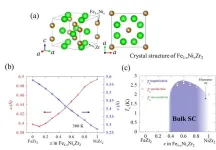(Press-News.org) A global survey spanning 68 countries reveals that public trust in scientists is still high. Led by the University of Zurich and ETH Zurich, a team of 241 researchers conducted the largest post-pandemic study of trust in science, societal expectations and public views on research priorities.
Trust in scientists is at a moderately high level worldwide, according to a new study. This is the conclusion of an international team of 241 researchers led by Viktoria Cologna of ETH Zurich and Niels G. Mede of the University of Zurich (UZH). “Our results show that most people in most countries have a relatively high level of trust in scientists,” says principal investigator Viktoria Cologna, “and want them to play an active role in society and politics.” The study found no evidence for the oft-repeated claim of a crisis of trust in science.
The study is the result of the TISP Many Labs study, a collaborative effort that allowed the authors to survey 71,922 people in 68 countries, including many under-researched countries in the Global South. For the first time since the coronavirus pandemic, the study provides global, representative survey data on the populations and regions of the world in which researchers are perceived to be most trustworthy, the extent to which they should engage with the public, and whether science is prioritizing important research issues.
No crisis of trust in science
Across 68 countries, the study finds that the majority of the public has a relatively high level of trust in scientists (mean trust level = 3.62, on a scale of 1 = very low trust to 5 = very high trust). The majority of respondents also perceive scientists as qualified (78%), honest (57%) and concerned about people’s well-being (56%).
However, the results also reveal some areas of concern. Globally, less than half of respondents (42%) believe that scientists pay attention to the views of others. “Our results also show that many people in many countries feel that the priorities of science are not always well aligned with their own priorities,” says co-author Niels G. Mede. “We recommend that scientists take these results seriously and find ways to be more receptive to feedback and open to dialogue with the public.”
Polarization of population groups and differences between countries
The findings confirm the results of previous studies that show significant differences between countries and population groups. In particular, people with right-wing political views in Western countries tend to have less trust in scientists than those with left-wing views. This suggests that attitudes toward science tend to polarize along political lines. In most countries, however, political orientation and trust in scientists were not related.
Call for active engagement of scientists
A majority of respondents want science to play an active role in society and policy-making. Globally, 83% of respondents believe that scientists should communicate with the public about science, providing an impetus for increased science communication efforts. Only a minority (23%) believe that scientists should not actively advocate for specific policies. 52% believe that scientists should be more involved in the policy-making process.
Participants gave high priority to research to improve public health, solve energy problems, and reduce poverty. On the other hand, research to develop defense and military technology was given a lower priority. In fact, participants explicitly believe that science is prioritizing the development of defense and military technology more than they would like, highlighting a potential misalignment between public and scientific priorities.
END
Global trust in science remains strong
2025-01-20
ELSE PRESS RELEASES FROM THIS DATE:
New global research reveals strong public trust in science
2025-01-20
A new international study on public trust in science, conducted across 68 countries, has found that most people trust scientists and believe they should be more involved in society and policymaking. Further, a majority of survey participants believe that scientists should be more involved in society and policymaking.
Published in Nature Human Behaviours (pre print link), this research was conducted by TISP, a Harvard University-based consortium led by Dr Viktoria Cologna (Harvard University, RTH Zurich) and Dr Niels G Mede (University of Zurich), which includes 241 researchers from 169 institutions worldwide, including the University of Bath.
The study, which includes 71,922 respondents—2,008 ...
Inflammation may explain stomach problems in psoriasis sufferers
2025-01-20
People with the skin condition psoriasis often have invisible inflammation in the small intestine with an increased propensity for ‘leaky gut’, according to new research at Uppsala University. These changes in the gut could explain why psoriasis sufferers often have gastrointestinal problems and are more prone to developing Crohn’s disease. The study is published in Biochimica et Biophysica Acta (BBA) – Molecular Basis of Disease.
Psoriasis is a hereditary, chronic skin condition that can also result in inflammation of the joints. In Sweden, almost 300,000 people live with some form of the condition. Chronic inflammatory bowel ...
Guidance on animal-borne infections in the Canadian Arctic
2025-01-20
A new review on zoonotic infections — diseases transmitted by animals — in the Canadian Arctic provides timely guidance to clinicians as the region experiences heightened global interest as well as climate change, which threatens the region and increases risk of disease transmission. The review, published in CMAJ (Canadian Medical Association Journal) https://www.cmaj.ca/lookup/doi/10.1503/cmaj.240541, provides guidance on how to identify and manage seven zoonotic infections in people.
“Indigenous Peoples continue to be caretakers of ...
Fatty muscles raise the risk of serious heart disease regardless of overall body weight
2025-01-20
People with pockets of fat hidden inside their muscles are at a higher risk of dying or being hospitalised from a heart attack or heart failure, regardless of their body mass index, according to research published in the European Heart Journal [1] today (Monday).
This ‘intermuscular’ fat is highly prized in beef steaks for cooking. However, little is known about this type of body fat in humans, and its impact on health. This is the first study to comprehensively investigate the effects of fatty muscles on heart disease.
The new finding adds evidence that existing measures, such as body mass index or waist ...
HKU ecologists uncover significant ecological impact of hybrid grouper release through religious practices
2025-01-19
Ecologists from the School of Biological Sciences (SBS) and the Swire Institute of Marine Science (SWIMS) at The University of Hong Kong (HKU) have identified significant ecological risks associated with the release of hybrid groupers into Hong Kong’s coastal waters, a practice often linked to religious ‘mercy release’ rituals.
Their study highlights how the Tiger Grouper-Giant Grouper hybrid (TGGG), also known as the Sabah grouper, disrupts local marine ecosystems by exploiting unique ecological niches and potentially becoming a dominant predator. This research, the first ...
New register opens to crown Champion Trees across the U.S.
2025-01-18
The National Champion Tree Program (NCTP) announced its first Register of Champion Trees since 2021. The program moved from American Forests to the University of Tennessee School of Natural Resources in 2023 and has spent the past year working with state-level Champion Tree programs across the U.S. to update outdated records and verify the newly crowned champions.
“We are thrilled beyond measure to share the list of the largest documented trees in the United States,” Jaq Payne, NCTP director, said. “These trees are more than just numbers on a website. They're living, breathing members of our community. I hope this register encourages folks to start ...
A unified approach to health data exchange
2025-01-18
About The Article: This article outlines the ways in which the U.S. Department of Health and Human Services has worked to use electronic health record data to improve patient health, public health, and health care.
Corresponding Author: To contact the corresponding author, Robert M. Califf, MD, email commissioner@fda.hhs.gov.
To access the embargoed study: Visit our For The Media website at this link https://media.jamanetwork.com/
(doi:10.1001/jama.2025.0068)
Editor’s ...
New superconductor with hallmark of unconventional superconductivity discovered
2025-01-18
Tokyo, Japan – Researchers from Tokyo Metropolitan University have discovered a new superconducting material. They combined iron, nickel, and zirconium, to create a new transition metal zirconide with different ratios of iron to nickel. While both iron zirconide and nickel zirconide are not superconducting, the newly prepared mixtures are, exhibiting a “dome-shaped” phase diagram typical of so-called “unconventional superconductors,” a promising avenue for developing high temperature superconducting materials which can be more widely deployed in society.
Superconductors already play ...
Global HIV study finds that cardiovascular risk models underestimate for key populations
2025-01-18
Cardiovascular disease (CVD) is the leading cause of morbidity and mortality globally, posing a particularly significant threat to people with HIV (PWH). To address this, CVD prevention plans rely on prediction models like atherosclerotic cardiovascular disease (ASCVD) risk scores to estimate the risk of heart disease.
However, previous studies have called into question whether these commonly used prediction models perform well among people with HIV, and there remains a gap in understanding of what these scores mean for PWH in low- and middle-income countries (LMICs).
Researchers from Massachusetts General Hospital, a founding member of the Mass General Brigham ...
New study offers insights into how populations conform or go against the crowd
2025-01-17
Cultural traits — the information, beliefs, behaviors, customs, and practices that shape the character of a population — are influenced by conformity, the tendency to align with others, or anti-conformity, the choice to deliberately diverge. A new way to model this dynamic interplay could ultimately help explain societal phenomena like political polarization, cultural trends, and the spread of misinformation.
A study published in the Proceedings of the National Academy of Sciences outlines this novel approach. Presenting a mathematical model, SFI Complexity Postdoctoral Fellow Kaleda Denton with colleagues ...




